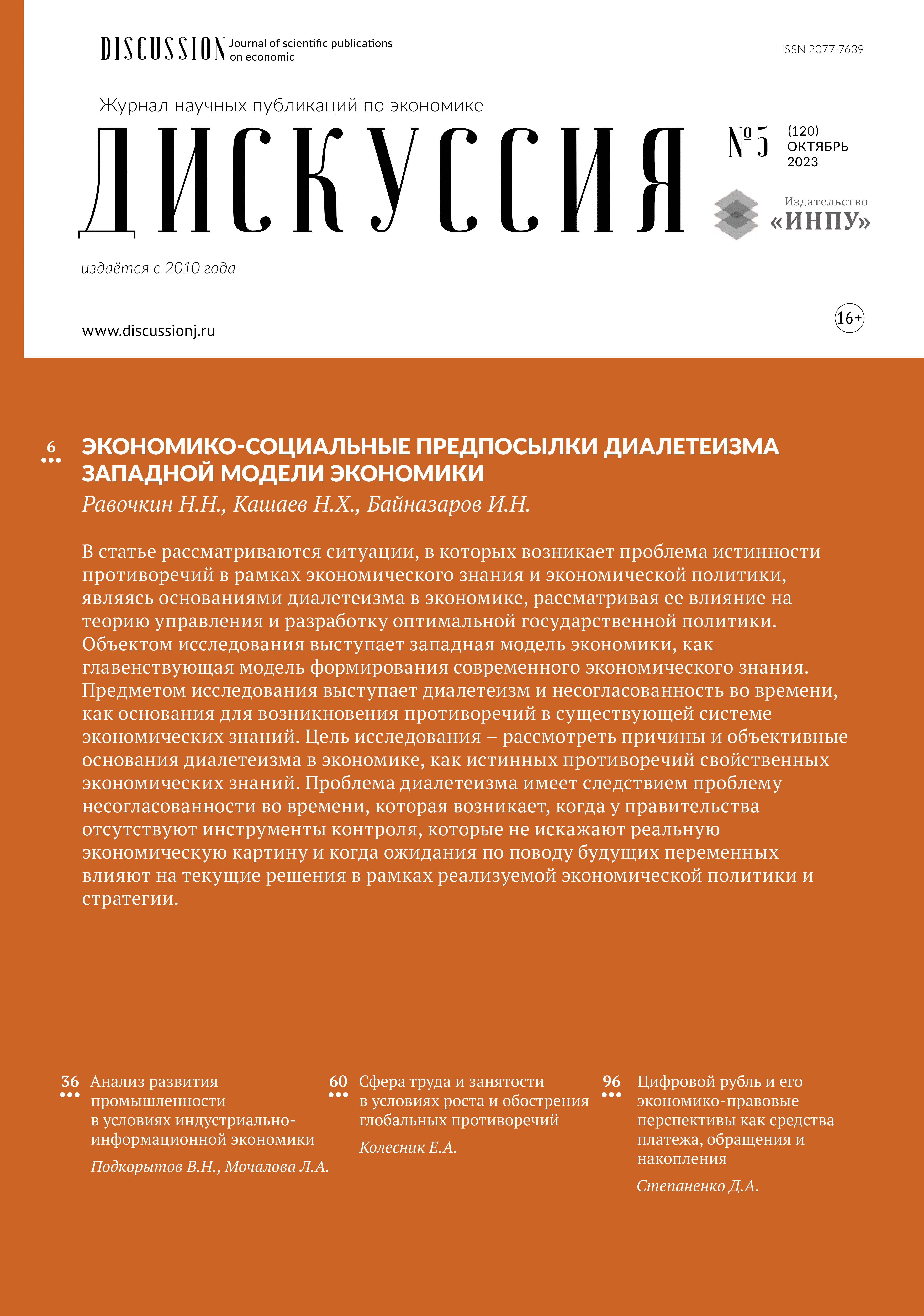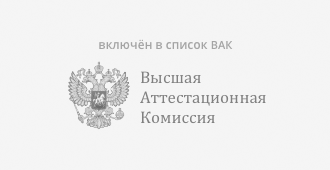BUILDING A COMMON ECONOMIC SPACE OF PARTNER COUNTRIES ON THE PRINCIPLES OF POLYCENTRISM AND COLLECTIVE RESPONSIBILITY
Keywords:
monocentrism, polycentrism, common good, public good, collective action, polycentric development, monocentric development, BRICSAbstract
The processes of globalization, which lead to a sharp differentiation of society in terms of the level and quality of life, the growth of economic contradictions and geopolitical tensions objectively reflect the ineffectiveness of a unipolar system. The article examines the organizational aspects of the multipolar structure of society and the economy, as opposed to the unipolarity of the modern structure of the world and the economy. The article examines the multipolar structure of the world through the construction of a single economic space. The object of research is society. The subject of the study is the single economic space. The purpose of the study is to consider the content of a multipolar system through the existing example of the BRICS informal community. The article argues that the multipolar structure of the world in terms of building a single economic space is based on the principles of polycentrism and collective responsibility. It is revealed that “public goods” presuppose the presence of economic goods - a limited set of resources used by different people, their use of which cannot be limited, and common goods are those resources, the possession of which requires collective production, cooperation and interaction: collective decisions, distribution of energy resources, food sharing, agriculture, financial assets and currencies, public health services, schools, environmental resources. It is argued that a single economic space on the principles of polycentrism implies the solution of common problems that people face in the course of solving problems, including the division and distribution of tasks, the distribution of benefits, and important in this case are the principles of organizing the common good and collective action, which oppose monocentric development, where one country or several countries dominate the public space.
Downloads
Metrics
References
Bollier D. The growth of the commons paradigm //Understanding knowledge as a commons: From theory to practice. – 2007. – Т. 27. – С. 29.
Copus A. K. From core-periphery to polycentric development: concepts of spatial and aspatial peripherality //European planning studies. – 2001. – Т. 9. – №. 4. – С. 539-552.- DOI 10.1080/713666491.
Meijers E., Waterhout B., Zonneveld W. Closing the gap: Territorial cohesion through polycentric development //European Journal of Spatial Development. – 2007. – Т. 5. – №. 2. – С. 1-24.- DOI 10.5281/zenodo.5137089
Rauhut D. Polycentricity–one concept or many? //European Planning Studies. – 2017. – Т. 25. – №. 2. – С. 332-348.- DOI 10.1080/09654313.2016.1276157.
Даведенко, С. В. Категория блага в классическом западно-Европейском дискурсе / С. В. Даведенко, Е. В. Бакшутова // Вестник Тверского государственного университета. Серия: Философия. – 2021. – № 1(55). – С. 168-179. – DOI 10.26456/vtphilos/2021.1.168. – EDN BQKJAP.
Sison A. J. G., Fontrodona J. The common good of the firm in the Aristotelian-Thomistic tradition //Business ethics quarterly. – 2012. – Т. 22. – №. 2. – С. 211-246. – DOI 10.5840/beq201222218.
Rendtorff J. D. (ed.). Power and principle in the market place: On ethics and economics. – Routledge, 2016.
Deneulin S., Townsend N. Public goods, global public goods and the common good //International journal of social economics. – 2007. – Т. 34. – №. 1/2. – С. 19-36. – DOI 10.1108/03068290710723345.
Hardin G. Extensions of" the tragedy of the commons" //Science. – 1998. – Т. 280. – №. 5364. – С. 682-683.
Hardin G. The tragedy of the commons //Thinking About the Environment. – Routledge, 2015. – С. 173-178.
Толмачев, П. И. БРИКС в контексте трендов полицентризма мировой экономики / П. И. Толмачев // Научно-технологическое и инновационное сотрудничество стран БРИКС : Материалы международной научно-практической конференции, Москва, 25–26 октября 2022 года. Том Выпуск 1. – Москва: Институт научной информации по общественным наукам РАН, 2023. – С. 227-229. – EDN XJKMZR.
Ногуейра Кавалканте, Ф. Р. БРИКС как политический институт формирования многополярной системы международных отношений / Ф. Р. Ногуейра Кавалканте // Social and economic development and quality of life: history and modern times : Materials of the VIII international scientific conference, Prague, 15–16 марта 2018 года. – Prague: Vědecko vydavatelské centrum «Sociosféra-CZ», 2018. – С. 126-128. – EDN WBGDJB.
Брындин, Е. Г. Технологический полицентризм БРИКС / Е. Г. Брындин // Глобальные процессы и новые форматы многостороннего сотрудничества : Сборник научных трудов участников конференции IV Международной научной конференции, Москва, 24–26 мая 2016 года / Под редакцией И.В. Ильина. – Москва: Межрегиональная общественная организация содействия изучению, пропаганде научного наследия Н.Д. Кондратьева, 2016. – С. 52-58. – EDN XDQWFP.
Карпов, С. А. Международные стратегии развития высокотехнологичных производств / С. А. Карпов // Экономика высокотехнологичных производств. – 2020. – Т. 1, № 4. – С. 197-208. – DOI 10.18334/evp.1.4.111218. – EDN DULYZH.
Ostrom E. Collective action and local development processes //Sociologica. – 2007. – Т. 1. – №. 3. DOI 10.2383/25950
Ostrom E. Building trust to solve commons dilemmas: Taking small steps to test an evolving theory of collective action. – Springer Berlin Heidelberg, 2009. – С. 207-228. DOI 10.1007/978-3-540-85436-4_13
Ostrom E. Analyzing collective action //Agricultural economics. – 2010. – Т. 41. – С. 155-166. DOI 10.1111/j.1574-0862.2010.00497.x.
Ostrom, E., Walker, J., & Gardner, R. Covenants with and without a sword: Self-governanceis possible. The American Political Science Review, 86, 1992, 404–417. doi:10.2307/1964229
Ostrom, E., & Walker, J. Neither markets nor states: Linking transformation processes incollective action arenas. In D. C. Mueller (Ed.), Perspectives on public choice: A handbook (pp.35–72), 1997. Cambridge: Cambridge University Press.
Downloads
Published
How to Cite
Issue
Section
Categories
License
Copyright (c) 2024 Г. В. Грецкий

This work is licensed under a Creative Commons Attribution-NonCommercial-NoDerivatives 4.0 International License.
Авторы, публикующие произведения в журнале «Дискуссия», соглашаются со следующими условиями:
- Авторы сохраняют за собой авторское право и предоставляют журналу право первой публикации произведения, одновременно лицензированной в соответствии с лицензией Creative Commons Attribution, позволяющей другим лицам пользоваться произведением с подтверждением авторства и первоначальной публикации в журнале «Дискуссия».
- Авторы вправе заключать с иными лицами лицензионные договоры на условиях простой (неисключительной) лицензии на использование опубликованного в журнале «Дискуссия» произведения (например, размещение его в базах данных университетов, публикация в книге), со ссылкой на его оригинальную публикацию в этом журнале.
- Автор гарантирует, что является правообладателем всех материалов, предоставляемых в редакцию, и что исключительные права на данные материалы не переданы или не предоставлены другим лицам.
- Авторам разрешено и рекомендуется размещать свое произведение в Интернете до и во время процесса подачи, поскольку это может привести к продуктивному обмену, а также к более раннему и более широкому цитированию опубликованных работ.
С момента загрузки произведения и сопроводительных материалов через раздел "Отправка материалов", автор полностью и безоговорочно принимает (акцептует) публичную оферту о заключении авторского соглашения об опубликовании произведения. В соотвтетствии с этим соглашением автор предоставляет издателю на безвозмездной основе неисключительную лицензию на использование созданного автором произведения.
С момента получения произведения и прилагаемых к нему материалов журнал "Дискуссия" вправе использовать полученные произведения без ограничений по своему усмотрению и в пределах всего срока действия исключительных прав, но с обязательным указанием имени автора (авторов) произведения, в том числе публиковать произведения (полностью или в сокращении) на территории всего мира, переводить на другие языки, направлять в репозитории научной информации, размещать в сети Интернет и использовать другими законными способами.









